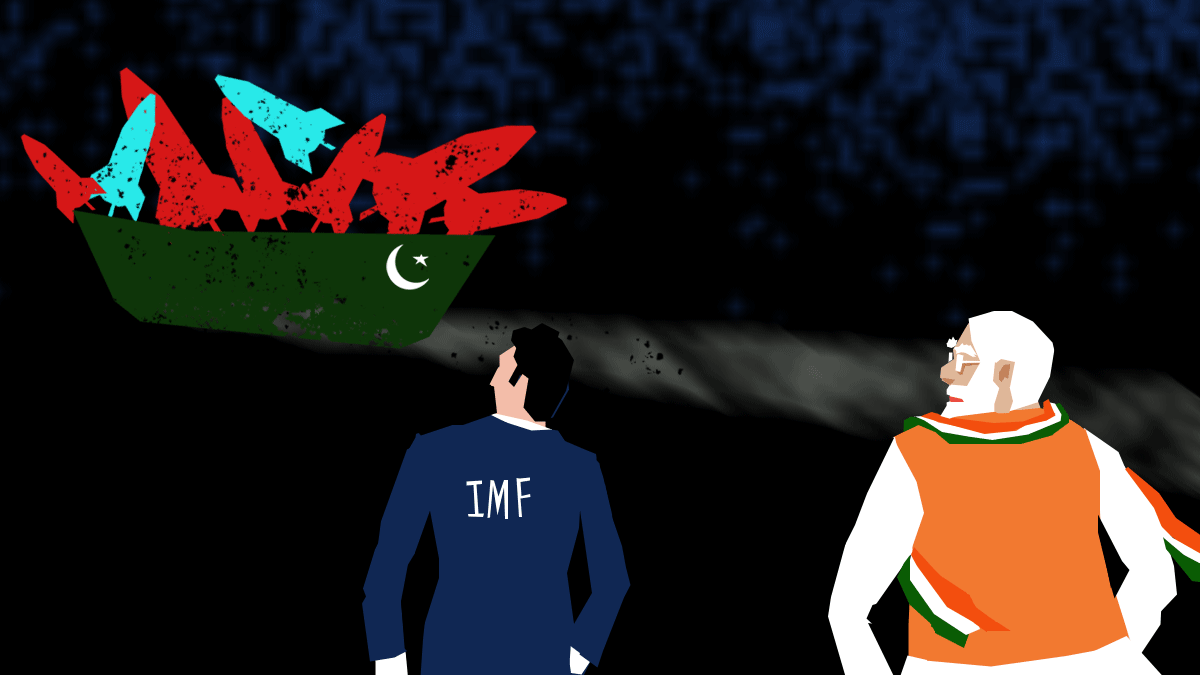It is time for India to raise its voice not just through military prowess, but through professionalism, principled voting and partnerships, asserts Deepak Mishra.

The decision by the International Monetary Fund (IMF) to approve a $2.4 billion lending programme to Pakistan while it was engaged in a tense military standoff with its neighbour has been met with concern and disappointment in India.
Subsequently, in a supplementary note, the IMF admitted that its reputation could be tarnished by any perceived misuse of funds, but it also claimed that 'these recent developments do not alter the thrust of the staff appraisal'.
The IMF's actions have raised many questions: Why would a multilateral institution, committed to neutrality, make such a move during an active war between its two member States?
And more importantly, what steps could India take to prevent similar actions from recurring?
An inconvenient truth
The uncomfortable reality is that multilateral institutions have not always remained impartial.
During the Cold War, these bodies often aligned with the interests of dominant shareholders, largely from the Western bloc.
The United States, as the largest donor to the multilateral system, routinely used its influence to channel funding toward its allies while denying support to adversaries.
This trend continued after the Cold War. In 1994, the IMF provided an $18 billion loan to Mexico that served to protect American investors.
In 2013, the IMF participated in a massive bailout for Greece, strongly backed by European powers looking to stabilise their own neighbourhood.
During the ongoing Russia-Ukraine conflict, multilateral agencies have offered generous financial assistance to Ukraine, while suspending their operations in Russia.
However, the recent lending to Pakistan deviates from this historical pattern. Unlike the Cold War period, this time, the major shareholders have remained neutral.
Second, the approval came during an active military confrontation -- an unsettling precedent.
A serial borrower
Pakistan's long-standing and frequent recourse to IMF funding is intriguing.
The country is the fourth-largest borrower of the IMF, having received between $25 billion and $30 billion over the past 25 years.
Such financial lifelines, along with bilateral assistance from China and Saudi Arabia, have helped Pakistan avoid economic collapse multiple times.
Why is the IMF pouring so much money into a country that The Economist has repeatedly called 'dangerously unstable' and a 'failing State'?
One explanation lies in a structural weakness within the IMF's lending framework.
Several studies have found that the IMF's desire to preserve its reputation as an effective monitor distorts its judgement.
Over time, it becomes increasingly lenient with serial borrowers, reinforcing a cycle of 'lending → failed programme → more lending'. Breaking such a cycle requires external intervention -- and India could play a role here.
India's options
During its G20 presidency, India took meaningful steps towards reforming the global financial architecture.
It set up an International Expert Group, co-chaired by N K Singh and Larry Summers, which produced far-reaching recommendations to enhance the capacity and accountability of multilateral development banks.
These ideas are now being taken forward, particularly by the World Bank.
Unfortunately, the IMF was left out of this reform agenda.
Looking ahead, how can India build greater influence within institutions like the IMF and ensure that its strategic interests are effectively represented?
1. Professionalise the talent pool: India must cultivate a strong cadre of development professionals to represent its interests in multilateral organisations.
At present, our best and brightest do not go to these institutions.
Assignments in Washington, DC, or Brussels are not seen as strategic priorities.
Appointments from academia or the private sector are rare. Indian professionals living abroad -- even if well-qualified -- are often overlooked due to misplaced concerns.
This must change. Our representatives must combine technical expertise with diplomatic acumen.
2. Rethink voting strategies: India has changed, but our voting pattern and alliances have not. We have traditionally aligned with other developing nations -- a legacy of our colonial past and non-aligned ethos.
But as India aspires to become a leading global power, it must be willing to recalibrate.
Countries such as Brazil and China have shown pragmatism by voting in ways that reflect their national interest even when diverging from the Global South.
India should adopt a similar issue-based approach, which will earn it trust and respect from global powers.
3. Strengthen global partnerships: India needs to deepen its intellectual presence in the Global North.
While we rightly champion the Global South, our policy infrastructure in the developed world has not kept pace with our growing ambitions.
There are only a handful of India-focused centres abroad, and Indian think-tanks have minimal visibility outside the country.
With strategic investment and by building on the goodwill generated during the G20, India should foster a global network of researchers and policy advocates who can champion our interests in multilateral forums.
The guns along the border have fallen silent, but the diplomatic battle for global influence continues.
It is time for India to raise its voice -- not just through military prowess, but through professionalism, principled voting and partnerships.
Deepak Mishra is director & CEO, Indian Council of Research on International Economic Relations, New Delhi.
Feature Presentation: Aslam Hunani/Rediff.com











